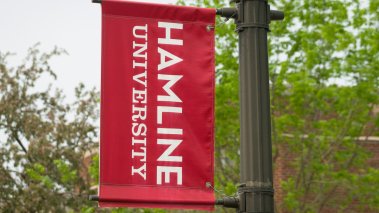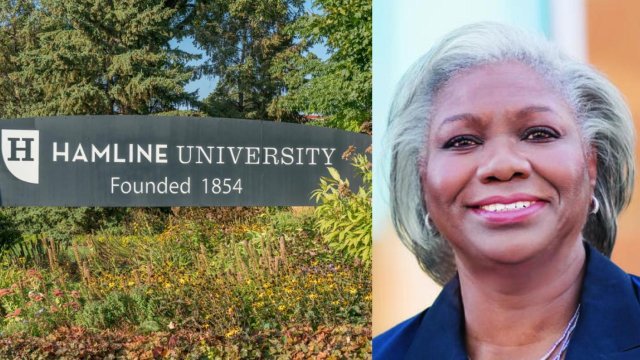Table of Contents
Hamline president declares academic freedom controversy over, but does little to allay faculty’s fears

Ken Wolter / Shutterstock.com
By all accounts, Hamline President Fayneese Miller is trying to put last year’s Muhammad image controversy in the rearview. Her methods, however, provide more questions than answers about the Minnesota liberal arts school’s ability to deliver on its subsequent academic freedom promises.
You may recall Miller was one of the Hamline administrators who made international news in December for non-renewing adjunct Erika López Prater for showing a painting depicting the Prophet Muhammad in a class on Islamic art. López Prater’s choice was unquestionably protected by the university’s academic freedom promises, which give faculty wide latitude over their course content. But after a student complained the image offended her, Hamline quickly denounced the professor’s teaching as “undeniably islamophobic.” The backlash to López Prater’s nonrenewal sparked a vote of no confidence in Miller, who agreed to step down from her position in June 2024.
After significant public outcry, López Prater sued Hamline. That litigation is ongoing. In the wake of the lawsuit, Miller and the university briefly rediscovered a commitment to academic freedom, claiming in a media statement that “It was never our intent to suggest that academic freedom is of lower concern or value than our students — care does not ‘supersede’ academic freedom, the two coexist.” But now Miller is back on the defensive.

Hamline University president triples down in defending instructor’s nonrenewal for showing Muhammad painting
News
Last month’s “academic freedom” forum at Hamline provoked significant backlash for the selection of panelists who were almost uniformly not in favor of robust academic freedom. Miller also repeatedly defended Hamline’s actions, claiming there was more to the story than meets the eye and that faculty have an obligation to put themselves in student’s shoes to determine what might offend them.
Then, in a recent letter published in The Chronicle of Higher Education in response to criticism from Hamline professor of religion Mark Berkson, she doubled down. Seeing Berkson’s assertions, Miller penned a rebuttal in the same outlet accusing Berkson of misrepresenting the event. She stated, “The overwhelming feeling in the room that day was not that Hamline needed to apologize.” “Instead,” she continued, “it was that higher education must find a better way to support academic freedom and still meet the needs of our students in a rapidly changing educational environment.”
Berkson claimed in a recent article for the Chronicle that despite the backlash Hamline received, last month’s panel event “did not discuss the controversy in any substantive way.” Instead, he argued, Miller continued to shirk responsibility for infringing López Prater’s academic freedom — and she offered dubious explanations for doing so. When discussing the tenets of academic freedom, Miller argued we must “still see who is in our classrooms,” appearing to imply that professors should speculate about student sensibilities and prioritize those sensibilities over their own subject matter and teaching expertise.
While these may reflect Miller’s views, they fly in the face of the true mission of an institution of higher education: to educate and challenge the adult students who are there to be educated and challenged.
Too often, students want freedom from speech they dislike. When professors are instructed to cater to this sensitivity, the quality of professors’ teaching and students’ education suffers.
While Miller may earnestly believe faculty and the administration should have a role in protecting students from subjectively objectionable content and/or lectures, that belief is fundamentally at odds with academic freedom. Miller’s response to Berkson also put her crosswise with the American Association of University Professors, whom Miller claims “did not conclude that Hamline violated anyone’s academic freedom.” But in fact, this past May, the AAUP produced a report that concluded Hamline clearly violated López Prater’s academic freedom, a point Chronicle Review editor Len Gutkin corroborated in his own response to Miller’s letter.
Worse still, Miller subsequently continued to insist that, for her, academic freedom may be beside the point. At a second Hamline-hosted event later in September, she recounted the blowup over López Prater’s art history lesson and said the quiet part out loud: “At the end of the day, the students are our recruiters, who go back into their community and talk about their experience as students. So it is a complex situation.” This suggests that when it comes to attracting students to Hamline, Miller believes censorship is an acceptable price to pay.
FIRE President and CEO Greg Lukianoff and social psychologist Jonathan Haidt discussed the prioritization of student satisfaction and comfort over academic rigor in their 2018 book, “The Coddling of the American Mind.” Greg and Adam Goldstein, FIRE’s vice president of research, further articulated the issue in a 2021 blog post:
The further a university drifts from its academic purpose, the less committed it will be to academic freedom. And the more it looks like a corporation in structure, the more it will act like a corporation indeed.
Too often, students want freedom from speech they dislike. When professors are instructed to cater to this sensitivity, the quality of professors’ teaching and students’ education suffers. Miller’s continued defense of this comfort-first approach at Hamline is disheartening for students and faculty alike.
FIRE defends the rights of students and faculty members — no matter their views — at public and private universities and colleges in the United States. If you are a student or a faculty member facing investigation or punishment for your speech, submit your case to FIRE today. If you’re a faculty member at a public college or university, call the Faculty Legal Defense Fund 24-hour hotline at 254-500-FLDF (3533). If you’re a college journalist facing censorship or a media law question, call the Student Press Freedom Initiative 24-hour hotline at 717-734-SPFI (7734).
Recent Articles
FIRE’s award-winning Newsdesk covers the free speech news you need to stay informed.

Texas tramples First Amendment rights with police crackdown of pro-Palestinian protests

Here’s what students need to know about protesting on campus right now

Kansas takes a stand for intellectual freedom


